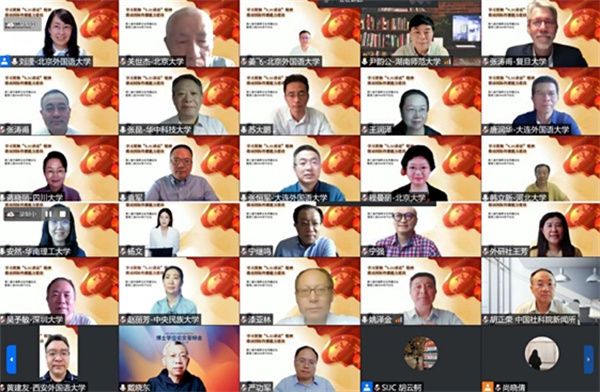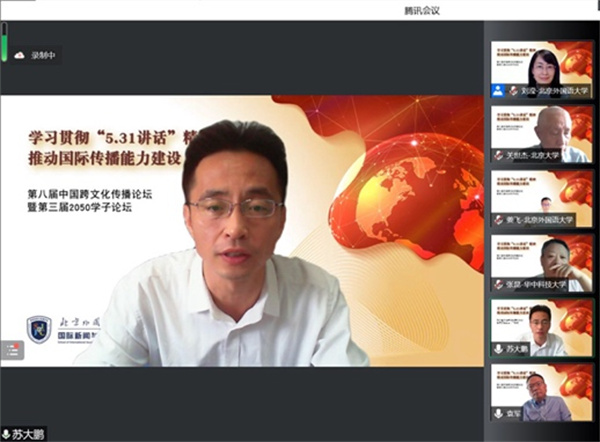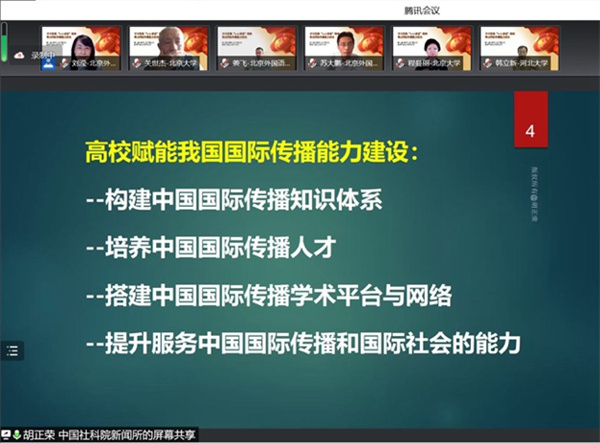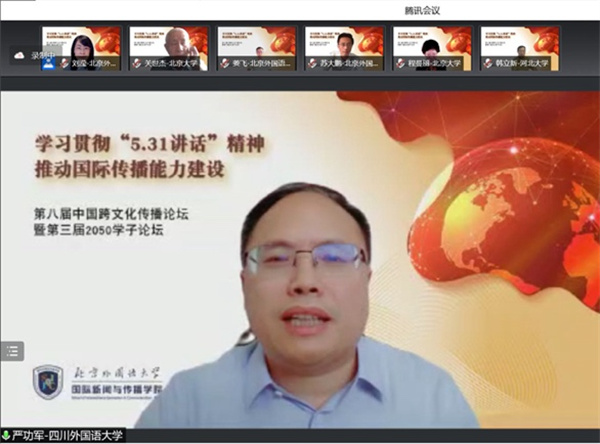- Research
- Research Centers
- Journals
- Admission
- Introduction
- Programs
- Application
- Alumni & Giving
- Alumni Club
- Giving

BFSU hosts the Eighth China Cross-Cultural Communication Forum and the Third 2050 Student Forum on May 28. [Photo/bfsu.edu.cn]
The School of International Journalism and Communication at Beijing Foreign Studies University (BFSU) held the Eighth China Cross-Cultural Communication Forum and the Third 2050 Student Forum via video conference on May 28. The two events had the support of the Research Committee of Foreign Journalism and Communication History at the Chinese Association for History of Journalism and Communication.
The virtual conference brought together experts, students and scholars from renowned universities and research institutes. They discussed new approaches to bolster China's international communication capacity and expand horizons for theoretical research and practices in international communication and cross-cultural exchanges.

Su Dapeng, deputy Party secretary of the CPC BFSU committee, keynotes the opening ceremony of the Eighth China Cross-Cultural Communication Forum and the Third 2050 Student Forum on May 28. [Photo/bfsu.edu.cn]
Su Dapeng, deputy Party secretary of the CPC BFSU committee, urged participants to explore innovative approaches to strengthen China’s international communication capacity, and summarize new practices and experiences in presenting Chinese stories.
Su said it is of great importance for China to create a large pipeline of versatile talents mastering both foreign languages and international communication ability to present Chinese stories in an internationalized way, and increase the appeal and effectiveness of the country's international communication. He added the importance of allowing young students to make their voices heard being the future backbones of the country.

Hu Zhengrong, head of the Institute of Journalism and Communication Studies at CASS and dean of the School of Journalism and Communication at UCASS, puts forward a four-point proposal to domestic universities on strengthening China’s international communication capacity. [Photo/bfsu.edu.cn]
Hu Zhengrong, head of the Institute of Journalism and Communication Studies at the Chinese Academy of Social Sciences (CASS) and dean of the School of Journalism and Communication at the University of Chinese Academy of Social Sciences (UCASS), put forward a four-point proposal on strengthening China’s international communication capacity. Accordingly, they should promote the building of a knowledge system for international communication with Chinese characteristics, and enhance their competence in serving China’s international communication cause and the international community.

Yan Gongjun, vice-president of SISU, speaks at the Eighth China Cross-Cultural Communication Forum and the Third 2050 Student Forum on May 28. [Photo/bfsu.edu.cn]
Yan Gongjun, vice-president of Sichuan International Studies University (SISU), said cross-cultural communication is such a process in which people aspire to construct a global community of diverse cultures on the basis of seeking common knowledge, empathy and consensus.
Yan urged all people involved in the discipline to have a thorough understanding of international situations, take strategic approaches to respond to cultural misunderstanding and achieve common knowledge, empathy, consensus and shared benefits amid the building of a community with a shared future for mankind.

Wang Fang (L), Party secretary of the CPC FLTRP Group committee, chair of the board of the FLTRP Group and president of the FLTRP, and Jiang Fei (R), dean of the School of International Journalism and Communication at BFSU, inaugurate the TICC on May 28. [Photo/bfsu.edu.cn]
Wang Fang, Party secretary of the CPC Foreign Language Teaching and Research Press (FLTRP) Group committee, chair of the board of the FLTRP Group and president of the FLTRP, and Jiang Fei, dean of the School of International Journalism and Communication at BFSU, unveiled the Test for International Communicative Competence (TICC) at the opening ceremony.
The new testing product, which is scheduled to be introduced in the second half of this year, will conduct an all-round assessment in such fields as cross-cultural communicative competence, international understanding and narrative capacity, media literacy and global citizenship, creating a standard for industry insiders in talent selection and charting a clear direction for future personal development.
During the keynote speech session following the opening ceremony, participants highlighted major problems faced by China in the promotion of international communication and talked about measures to make Chinese stories better known from the perspectives of journalism history, semiology, smart communication technologies and cultural identity.
At a parallel forum featuring the development of international journalism and communication discipline and talent cultivation, school leaders and experts from more than 10 universities held talks on new methods in nurturing international journalism.
The forum also consisted of four parallel forums on China’s cross-cultural communication and four 2050 student forums. Their topics included relations between the construction of China's national image and the Beijing 2022 Winter Olympics, the internet, metaverse and international communication, cross-cultural communication and the sense of community, film and television communication and the narration of Chinese stories, as well as Generation Z and international communication.
Liu Ying, vice-dean of the School of International Journalism and Communication at BFSU, conveyed thanks to participants for their attendance.